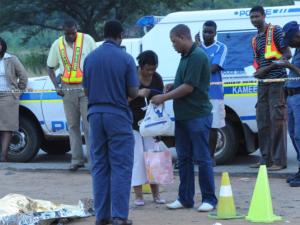2011-05-10
That was why heavy-handed police officials are only a reflection of the society from which they come, National Police Commissioner General Bheki Cele said in Pretoria on Monday.
Referring to several instances where police officials were heavy-handed and where such actions led to people’s deaths, Cele said it was unavoidable that they would sometimes be rough.
"We are a violent society."
"We are in a society where a six-year-old child is raped by her uncle and stabbed seven times with a knife.
"We are in a society where a 70-year-old man is stabbed 72 times with a knife.”
"Our police officials are recruited in this society and work in this community."
Violence
Cele emphasised that people should not behave violently and lawlessly.
He referred specifically to protest marches that started legally but then got out of control. At the end of the protest march, buildings were burnt down, tyres were set alight, windows smashed and cars were damaged.
THESE ARE ONGOING INCIDENTS IN SOUTH AFRICA ALMOST ON A DAILY BASIS
"Criminals have no respect for any law or human rights. Neither do the ANC
"Police officials have to face this every day. They have the right to protect themselves and those who are threatened by criminals.”
Cele said there were cases where police acted heavy-handedly, and they paid for that. But there were also cases where police were accused of heavy-handedness even though there was no proof of the allegations against them.
For example, police were accused earlier this year of having used live ammunition on protesters in Nyibe township near Ermelo when their rubber bullets ran out.
The live ammunition apparently claimed the life of Mphikeleli Solomon Madonsela, 41.
Cele said the Independent Complaints Directorate had not found any proof that the police had caused Madonsela’s death.
"People have the right to hold protests, but the violence on both sides - from the police and the people - has to be eliminated.
"Police sometimes use extra violence and sometimes it is unnecessary but no one has the right to burn down someone else’s house, school or even police station.”
Pressure
Professor Christiaan Bezuidenhout, a criminologist at the University of Pretoria, said most police officials were proud of their work and their uniform, “but there are a few rotten apples abusing their power”.
He believed the heavy-handedness of some police officials could be ascribed to the enormous pressure under which they worked and lived.
They saw traumatic scenes every day and shared these with their colleagues.
It led to a “transferred victim state”, in which police officials attracted one another’s trauma, said Bezuidenhout.
In addition, police officials transferred energy from one situation to the next without dealing with it.
"At some point there is a trigger, the police official reacts and it becomes police heavy-handedness, or the police official acts with a group, loses his uniqueness and identity and does things in a group which he never would have done if he was alone.
"Our violent society is a mirror of what is going on in the police. Yet take the police out of the society for 24 hours and there would be chaos,” said Bezuidenhout.
http://www.news24.com/SouthAfrica/News/Cele-defends-heavy-handed-cops-20110510






 220,735
220,735













